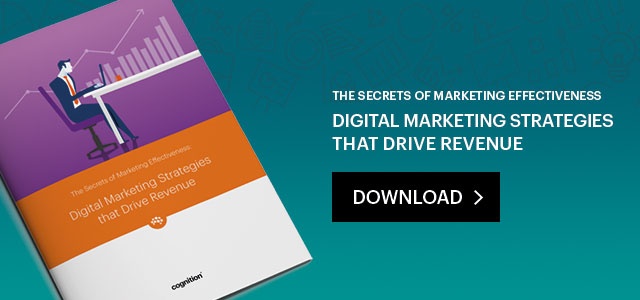The marketing world is a demanding, ever-changing environment. Businesses not only have to keep up with current trends and industry developments, but also stay ahead of their competitors and stay focused on their overall goals.
The ability to do this is often the difference between a business achieving its full potential or not.
There are some elements of digital marketing that are crucial to get right: your website, your messaging, your target audience – but mistakes in these areas are not the only reasons for failure.
Here are eight reasons that your digital marketing may not work out, and they may not be what you think they are.
- 1. Is there a blocker in the business?
-
We’re all naturally averse to change but, when it comes to moving your business forward, some people can be more averse than others. We’ve all worked with people who constantly block new ideas or initiatives, causing the business as a whole to fall behind. What can we do about these individuals, these ‘blockers’? The short answer is to find out what they are afraid of – what psychological biases and habits are causing them to stay stuck? Is it a lack of experience in their role, or perhaps a gap in training? People have a great fear of being humiliated, so instead of speaking up they will try and put the brakes on anything that might expose their weaknesses.
-
2. Technology over strategy
- Investing in a technology platform without understanding how it fits into your overall strategy is a mistake most of us have made, and it’s not only irresponsible but a complete waste of resources. The truth is, technology – no matter how complex and advanced – only works when it is in line with business goals; when it actually, tangibly drives ROI. Investing in something cool without understanding what problem it solves or how it will help you resonate with your audience is a huge mistake. Get your strategy in line first, then the technology you actually need, rather than want, will become apparent.
- 3. Overcomplicating the process
- Creating a successful marketing plan is a complicated process, but we don’t help ourselves by making it harder than it needs to be. When first starting out with a marketing campaign it’s fine to not know all the answers. In fact, it would be dangerous to think you know all the answers before you actually do. Start small, test, collect data – this way you’re gaining valuable knowledge about your market without straining your financial resources. Then, when you think you have a winning formula, scale it up, get bolder. That’s how you get results.
- 4. Lack of strategy and planning
- Great marketing campaigns and their corresponding results don’t just fall out of the sky. It is absolutely critical that you know your customer journey inside out. That you do everything you can to improve the customer experience. All of this comes down to planning – to developing an informed, measurable marketing strategy that allows for constant learning and improvement. When you take this ‘kaizen’ approach – which means making small, consistent improvements until you reach a state of perpetual and positive transformation – your digital marketing can only succeed.
- 5. Marketing and sales are not aligned
- Marketing and sales teams do not always see eye to eye and this is a huge problem for a growing business. Both teams have a wealth of invaluable insight and feedback which is lost when there is a lack of communication. The best way to bridge this gap is to make it clear how their goals are aligned – incentivise them to work together. Better yet, adopt systems that encourage them to efficiently and effectively communicate. When knowledge between teams is shared consistently there arises the opportunity to create truly impactful marketing campaigns that leave competitors scratching their heads as to how you did it.
- 6. Building a website for you, not for your customers
- Creating a new website for your business is an exciting time but it’s so easy to get it wrong. Most of the time, when websites fail to satisfy customers, it’s because the execs of the business made it about ‘me’ rather than ‘us’. Understand that your website is the first thing a prospective customer is going to see when they search for your business. It’s in your interest to make it as easy to use and as frictionless as possible. When planning it out, shut off the voice in your head that says ‘I’d like this, I’d like that’ – think about your customers, existing and potential. Then build for them. It’s all for them, anyway.
- 7. Failing to nurture at all levels of the buyer’s journey
- Communicating to your prospects shouldn’t end the moment they become qualified leads, or even when they become a customer. Nurturing the people and businesses who are interested in your brand and who buy from you is a never-ending process of giving value. Intimately understanding the journey they take, the challenges they face, and then using marketing and sales automation, to communicate depending on where they are in the buyer's journey and provide them with effective solutions is a fail-proof way to keep your sales pipeline full.
- 8. Lack of focus on talent acquisition
- Because data and technology is so important these days one area that doesn’t get the attention it deserves is talent acquisition. The best and most successful businesses know that their ongoing success depends on the talent they can attract. This means providing training, support, mentoring, leadership, perks – all of the things that help staff develop, be happier and ultimately provide more value to the business. Great marketing doesn’t just happen; talented people make it happen. By focusing on your hiring strategy and bringing in the right people you indirectly improve the quality (and results) of your work.
Moving beyond failure
Your business exists for one reason: To create extraordinary customer experiences.
Read our guide, “The Secrets of Marketing Effectiveness: Digital Marketing Strategies that Drive Revenue“ – Whilst forward thinking organisations are always on the lookout for the most effective marketing strategy possible, there are some key considerations to take onboard to increase the chances of success.
Read more? Download your free copy here:





